Podcast: Momentum builds for BART’s cleaning revolution
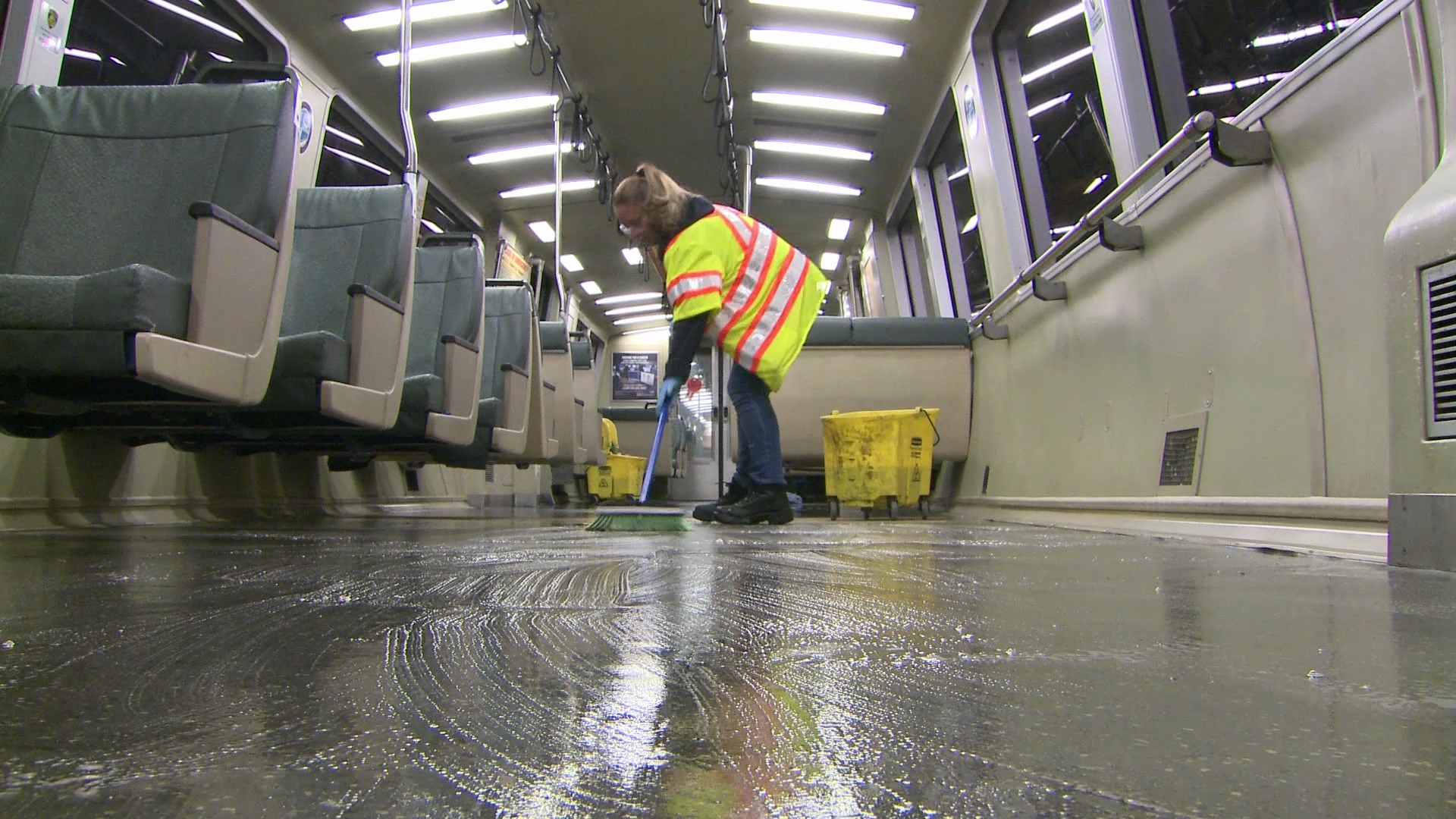
Transcript below:
HOST: “Welcome to “Hidden Tracks: Stories from BART.” This time we’re talking about all things cleaning with the two men who have been at the center of an important transformation that has taken place over the last year. BART is redoing the way it cleans its trains and stations. This far-reaching effort is having an impact on everything from hiring, training, where employees are staffed, and even what kind of cleaning materials are used on the job.
To talk more about what is without question a hugely important topic for BART riders is Jeffrey Baker who is the Superintendent of System Service at BART, which means he oversees all of the workers who clean our stations and Juan Matta who is the Manager of Transit Vehicle Cleaning. Thank you both for being on Hidden Tracks.”
BAKER AND MATTA: “Hello, thanks for having us.”
HOST: “Juan let’s start with you, you’ve been with BART for three years now. What is the hardest thing to clean on a train?”
MATTA: “Some of the biohazards that are left behind by some of our homeless or less stable riders. There are folks who are homeless and are not doing well physically or mentally and especially in cold weather they’ll get on the trains and ride all day to stay out of the elements and leave messes behind. These can be difficult and challenging and unpleasant to clean up. Unpleasant to ride with if you’re a passenger. We also have a policy about not getting too close to an individual who is sleeping or who may appear unstable. You may see a homeless patron on a train with some debris under him or around him and it looks like garbage, but we’ve had employees where they’ve picked up and discarded some of those items and got yelled at, even physically assaulted for discarding someone’s possessions so we have to be very careful.”
HOST: “You look at BART, we have a legacy fleet of 669 cars, we’re adding Fleet of the Future cars to the mix now all the time now. How big of a challenge is it to keep all those cars clean and how many people do you have helping you out with it?”
MATTA: “Well it is a huge challenge. We have 143 full-time employees. We are hiring right now, there’s going to be five more starting in the next month. We clean trains two different ways. We clean trains when they layup and are not running in the middle of the night in four different locations where we have rail yards. Employees in those locations walk through all the trains, pick up trash, mop up spills, look for graffiti, clean up any biohazards, pick up syringes, and things like that. When they have more time they perform more detailed, deeper cleaning like windows and cleaning stanchions, poles, walls, splashes, and spills and stuff like that. In addition, every car is scheduled to received what we call a thorough clean every 90 days where it’s clean from top to bottom where every surface of the car is cleaned and disinfected.”
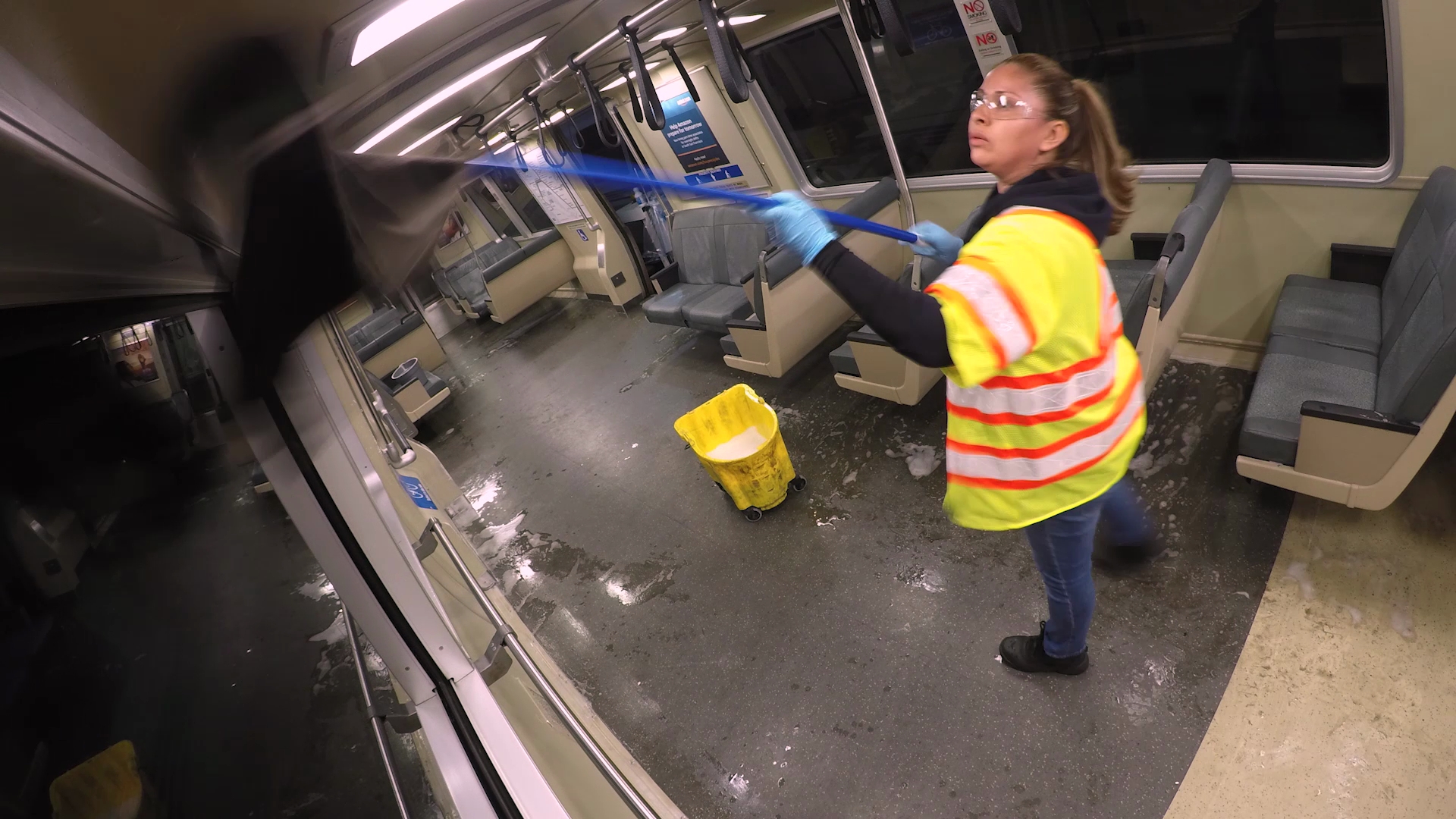
HOST: “That’s an important question that I think all of our riders have is how often do we really clean our cars. When you talk about that there are two different types of cleaning, but the fact is they all get attention.”
MATTA: “Every car in the fleet gets cleaned every night, at least the basic cleaning. Sweep, mop, wipe up spills, biohazards, graffiti, needles and the thorough cleaning is every 90 days with the top to bottom on every surface.”
HOST: “Tell me more about that, a thorough cleaning. What does that entail, are we talking about disinfecting a car?”
MATTA: “Yes, that’s part of the process. Every surface is wiped down with soap and cleaner and disinfecting chemicals form the ceiling to the floor, the walls, the seats, grab bars, the stanchions, the windows, the seat cushions, the arm rests, you name it. Everything is touched and cleaned and disinfected and this gets scheduled every 90 days. Now in between those times we clean as needed. If there’s a splash on a wall we clean up that splash, if there’s a spill we clean up the spill, we spot mop the floors, and sweep and pick up trash every night but the detailed thorough cleaning is every 90 days.”
HOST: “We’ve talked about end of the line cleaning before. I think everyone is aware that happens at the end of the lines. But beyond that one of the big changes that has been happening with cleaning at BART is the addition of the rapid response team. That started at the end of June last year. Where is the rapid response team stationed and how do they get deployed?”
MATTA: “They’re at two locations at the center of the system at Lake Merritt and 12th Street. From those two locations we can clean trains on every line because every line will pass through one of those two stations. The purpose of the rapid response team is to respond to reported complaints by patrons or by BART’s Operations Control Center. If a patron pushes the red call button at the end of the train car and reports a spill or something else on a train that goes to the train operator. The train operator relays it to our operations central control and then it gets dispatched out to rapid response or whatever other location it’s closest to. Then we have employees who will board the train and look for the mess and clean it up.”
HOST: “That is a huge change in terms of the quality of life on BART because heretofore a lot of messes would stay on the system. If something happened at Bay Fair, it could stay there until the end of the line or wherever it happened to be but now we’re talking about a much more rapid response to these issues. How has that been going, has it been effective?”
MATTA: “Yes, it’s been very effective. We’ve seen an increase in the customers saying that the trains are looking better. Customers see our employees boarding trains to pick up things and they get thanked, they get applauded. It’s wonderful to see. There are times during commute times when trains are really packed and it’s difficult for the rapid response team to actually enter a train. There are times when patrons just don’t want to give up a seat to allow our employees to get under that seat to look for a syringe or something like that and we’ve had to let it go a little bit farther down the line till the train is a little less crowded, so we can get on.”
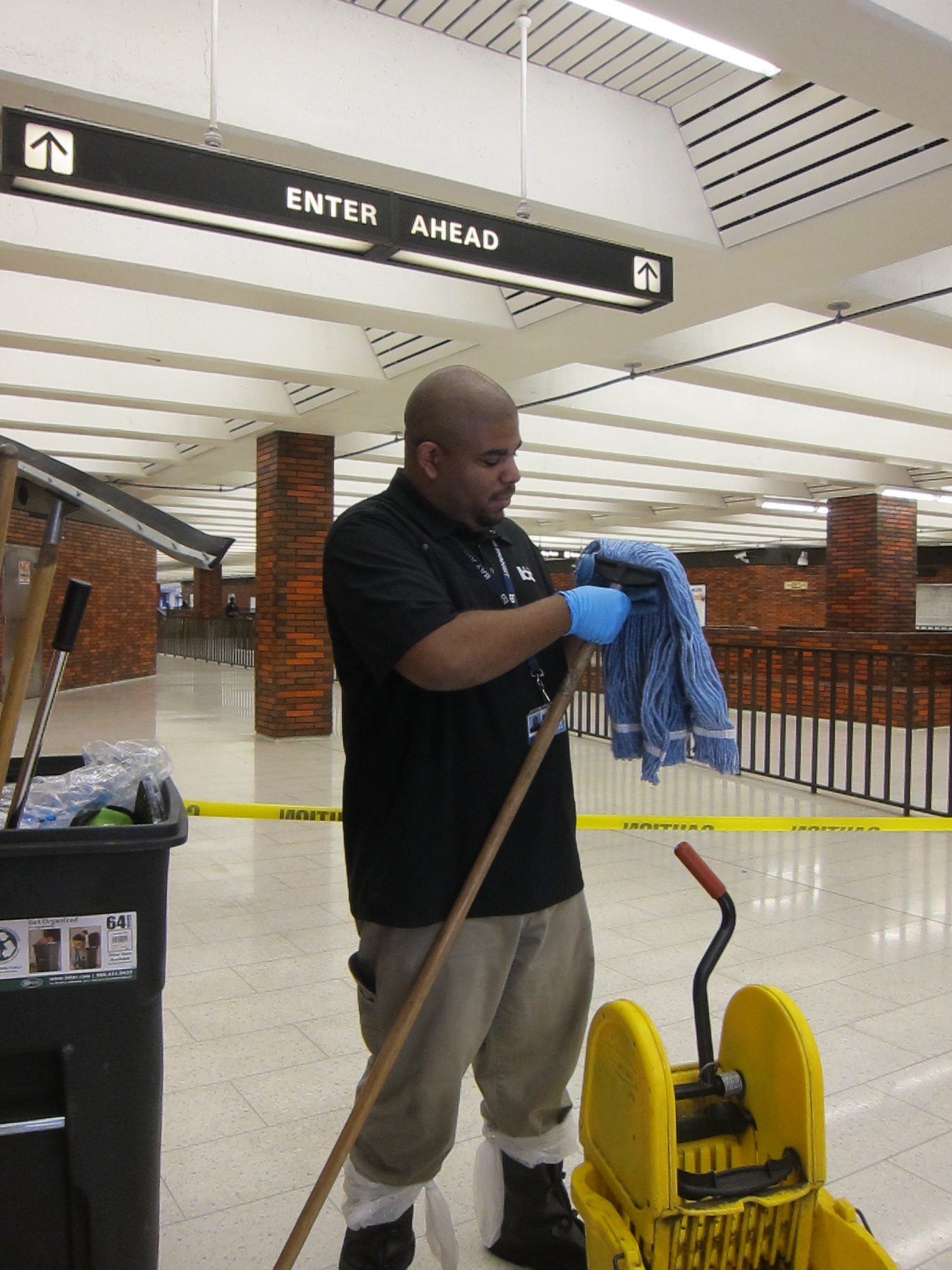
HOST: “Jeffrey Baker, let me bring you in now. You’ve been with BART for 19 years, so you’ve really seen it all when it comes to cleaning. There have been a lot of structural changes when it comes to how we clean our stations and I know that’s your area of focus. Maybe the first and foremost of all of those is just adding more people. It seems like a lot of vacant positions have been filled, is that correct?”
BAKER: “That is correct. We have now 147 System Service Workers, we’ve filled quite a few vacancies over the past year. One of the issues we’ve found, but it’s actually a good thing for our workers, is that many of them are getting promoted. We have members from our System Service Team that have become Station Agents, Train Operators and they move on to other positions within BART. We like to promote from within. Another thing we’re very proud of is our escalator/elevator attendant training program, which trains System Service Workers and even some of the Utility Workers that clean the cars can become elevator and escalator technicians by going through training, which is done here at BART so we’re very proud of that.”
HOST: “It’s great to have more resources but it’s also vital to get the most out of what you have. Talk about how things have changed for your team when it comes to how many people you’re assigning to stations because it sounds like the focus is on concentrating resources where they’re needed the most.”
BAKER: “That is correct. What we did is we looked at our staffing and we divided the stations into those that get heavy use, heavy passenger loads such as our downtown San Francisco stations as well as some of our busier transfer stations such as MacArthur, 19th Street, Lake Merritt. We found that those stations had a high turnover passenger load and we wanted to make sure that those areas, especially the high-traffic areas like stairways and escalators remain free of spills and slip hazards. Safety is one of the important things that we have to do in these downtown stations and the busy stations. We want to make sure that the platforms, stairways remain free of debris and things that may cause slip hazards.”
HOST: “Preparation is important for any job and maybe even more so for cleaners because they face messes that most of us don’t want to even imagine some of the stuff they have to clean up. That’s just the reality of the job. What are some of the changes that have been made to improve training at BART?”
BAKER: “When I came into the System Service Department over a year ago, actually I spent most of my career in the car cleaning area where Juan is today. One of the things that happened back in 2017 is Transit Resource Associates came into BART and did an analysis of our cleaning program. One of the things they suggested, and we also noticed that as well when we took over the System Service Department in the M&E Department is that we needed to focus on training to really get the most out of the very fine, professional cleaners we have. So, we brought in ISSA, which is an international standard organization, and they have an institute called the Cleaning Management Institute that came in. They have one of the top trainers in the nation who has trained cleaners all over the world and we brought in a program that catered to what BART needed. From top to bottom we’ve revitalized our training program and we’ve delivered that to our existing staff. We’re instituting training for supervisors and foreworkers as well.”
HOST: “Part of that top to bottom review is really basic yet extremely important stuff. For example, looking at the cleaning products that are used by your team. That was even something that was looked at, is that right?”
BAKER: “That is correct, for instance we changed from an old vendor that was giving us rags that left lint all over the place and now we’re using the microfiber clothes, which our more efficient and easier for our workers to use. We get our workers involved in analyzing the products, the equipment, and best-of-industry types of things that will make their job easier and give us better results as well.”
HOST: “I would think that would be a really useful thing for employee morale as well. The idea that they have a stake in this and they get some say in the items that they’re able to use. Does it have that sort of a payoff?
BAKER: “Yes it does and we’re very proud of our team that has come forward. Sometimes they were reluctant at first thinking, ‘well, I won’t ask for this because I don’t actually think I’m going to get it.’ But once the dialogue has opened up we’ve really made some changes and look forward to continuing that dialogue so that our team has the best supplies and equipment that we can provide for them.”
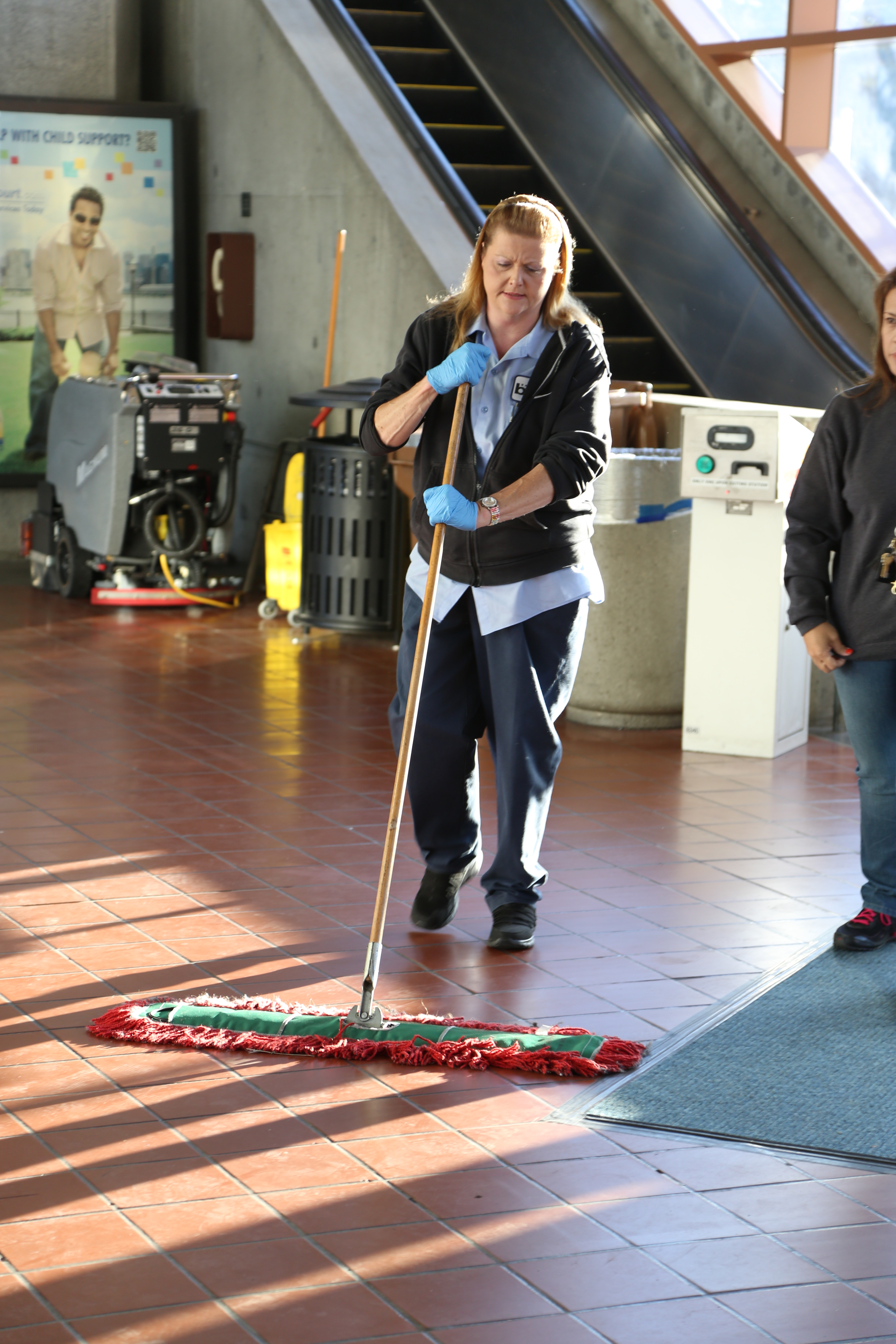
HOST: “I’m speaking with Jeffrey Baker, BART’s Superintendent of System Service and Juan Matta who is BART’s Manager of Transit Vehicle Cleaning talking about all that’s being done to clean our stations and trains. You talk about having this top to bottom review. I think an important part of that as well is really to have the outside experts come in and take a look at things and give you that feedback from the outside, that fresh set of eyes it seems could be really important. Talk about the value of that.”
BAKER: “I think it was very important because when we have someone from the outside such as the ISSA and we also brought in a third-party auditor, Core Management, and they came, and they looked at our standards against industries. They looked at BART’s cleanliness and appearance and it measured it against things like shopping malls, airports, other facilities and gave us some really good feedback. Sometimes when we’re in the middle of a situation we can’t really see it from the inside so it’s important that we have that outside look at what we’re facing.”
HOST: “That’s an important thing too is perspective and something like that can provide context. In terms of that comparison, how did BART stack up to all these other entities, be it a shopping mall or any other public place?”
BAKER: “They really praised us for the efforts because when they came in as a third-party audit we had already started the new training program and they saw the effects of that. One of the things that they noticed, however, was that the impact of homelessness on BART is really having an impact on our cleanliness. That’s a problem that we have that would not necessarily occur in private malls and so forth like a mall can keep someone from coming in because it’s not a public space. As far as the cleanliness of our system, we rate fairly well amongst other transit systems that have public spaces, but I think we can talk about some of the efforts that we do with other departments at BART to make sure we have the highest quality of environment that we can given the circumstances. That means teaming up with the police department, some outreach teams. We have some homeless outreach teams from outside agencies that actually come into BART and help provide services for some of our frequent people who come in and lodge in our public and fare gate areas. Probably the most difficult challenge is we have to clean up after people who are experiencing homelessness or drug addiction and sometimes the side effects of that are loss of control of their bodily fluids and it’s left for us to clean up. It’s not very pleasant. The other thing that I would say is difficult sometimes is the vandalism. People come in and do graffiti vandalism. We have zero-tolerance for vandalism that is offensive. We get all vandalism as soon as practical but when it’s something offensive racial or something offending a group of individuals that’s part of the Bay Area public we do not tolerate that, and we mitigate and clean that as soon as we’re notified.”
HOST: “And Juan I know that zero-tolerance policy for graffiti that definitely extends to the trains as well.”
MATTA: “We have a zero-tolerance policy for exterior graffiti on trains. We had a rash of graffiti incidents about a month ago where there was an international graffiti, I hesitate to use the word artist, but several cars were tagged and so we have to pull the car out of service and bring in employees and spend a great deal of time and money and effort to remove all this paint. It’s bad for the environment, it’s costing our patrons money in paying for all this to be done and it’s unfortunate but as soon as we discovered it we pull it off the line and clean it up.”
HOST: “That individual was arrested thanks in no small part to the investigation by the BART Police Department. Another subject I think for a lot of our riders is, candidly they get frustrated sometimes. Their bottom line is they’re on their way to work, they’re going to go visit someone, they’re counting on BART. They want safe, clean, reliable transit. They see a mess and it can be frustrating for them. What’s your message to folks that feel that frustration? What do you want them to know?
MATTA: “I want them to know that we feel that frustration also. Our employees take a great deal of pride in the work that they do. They ride the trains regularly they have friends and family who ride the trains regularly and they want the trains to clean and safe for everyone, for all riders. Please, if you see a problem the best thing to do is to report it either through the app or report it to the train operator by pushing the red call button on the train and we will get to it and clean it as soon as we can.”
HOST: “Same question for you Jeffrey what would you want riders to know about the job that you and your team do?”
BAKER: “I think our public from recent satisfaction surveys, most people do understand what we’re facing, and I want them to know that our front-line cleaners have pride in their job. They are just as frustrated as some of the public as far as what happens right after they clean up something, a mess again appears. The quality of life in the Bay Area, they contribute to make it better. We’re not where we want to be. We wish we had more cleaners, we wish we could work around the clock. For instance, we have three shifts and we can’t really be there at every station at every hour. So, sometimes it looks as if, we’ll there’s a mess on the ground why isn’t someone cleaning it up? We have a lot of area to cover and we do the best we can. That’s why we ask our passengers to be patient with us and to understand that they have options too to let us know through the BART app. Also, I must say that my workers are reporting they get occasionally someone coming by and saying thank you. They are out there sweeping, cleaning, moping and a passenger will come by and say, ‘thank you for doing what you do.’ That goes a long way for someone that’s on the front line.”
HOST: “I’m speaking with Jeffrey Baker, BART’s Superintendent of System Service and Juan Matta who is BART’s Manager of Transit Vehicle Cleaning talking about all that’s being done to clean our stations and our trains. I would imagine just the nature of the job that you have to confront this variety of messes and as we mentioned earlier you’re working in an environment that’s impacted by the homelessness crisis and you’re dealing a lot of times with folks who are in a crisis themselves and that’s one of the challenges of the job. What can be done, what is being done to prepare those frontline workers that might have that direct interaction to prepare them for that experience? Jeffrey, we’ll start with you.”
BAKER: “One of the things that we do is we’re having regular safety meetings and we’re talking about how they can help but yet not get involved with certain situations. I mentioned earlier we have a partnership with BART police. We meet regularly and talk about there are certain individuals at certain stations that we see every day. So, we identify candidates for the homeless outreach teams and or BART police to intervene because we see things that maybe they won’t be able to see. The bottom line is to get the individuals help and to allow the proper and trained personnel to do that work.”
HOST: “Juan, same for you.”
MATTA: “We also have safety meetings and trainings for new employees and we tell all of our employees to of course be helpful and polite to patrons who have questions or need help navigating the system but we also instruct all of our employees that if they see someone acting in a highly suspicious, erratic, or dangerous manner or committing a crime to report it to the proper authority immediately. We really don’t intervene in situations with unstable homeless people, that’s for BART police and other organizations to intervene in those kinds of situations. The safety of our employees comes first. There’s a dangerous situation, they report it immediately, and make themselves safe so they can clean another day.”
HOST: “Juan, do you feel like progress is being made in terms of dealing with, in your case, cleanliness of trains? We’ve talk about a lot of changes: rapid response team, hiring more folks, are we headed in the right direction?”
MATTA: “We definitely are. I’ve seen firsthand the difference in the last year since we instituted the Rapid Response Team and expanded some of our end of line hours and locations. There’s definitely been an increase in the level of cleanliness on the trains. But it’s, as you said earlier, everyday there’s a new challenge. Things are constantly changing. We’re up against a large regional homelessness and opioid crisis and many of those people seek out trains and stations as a refuge out of the elements, especially in cold weather. It’s an on-going challenge but there’s definitely been progress.”
HOST: “Jeffrey, same question for you. A year of reform is it paying off?”
BAKER: “Yes, it definitely is paying off. As I mentioned before, our meetings and our continued interaction with the Homeless Outreach Teams in San Francisco County as well as now the East Bay Counties just came on board and we’ve identified the places in our stations where they would be most effective in their interventions. We also have the Elevator Attendant Program in downtown San Francisco stations, which has really paid off and made those elevators more safe for our patrons. When they go in, there’s someone there to make sure they get safely to their destination and also that team reports to us if anything needs attention right away. We’ve also have upped our game as far as training on handling sharp objects such as needles and we have done extensive training involving some of the other outside community organizations such as San Francisco AIDS Foundation has come in and actually done some needle pickups in and around BART property as they intervene with some people in crisis who might need some help.”
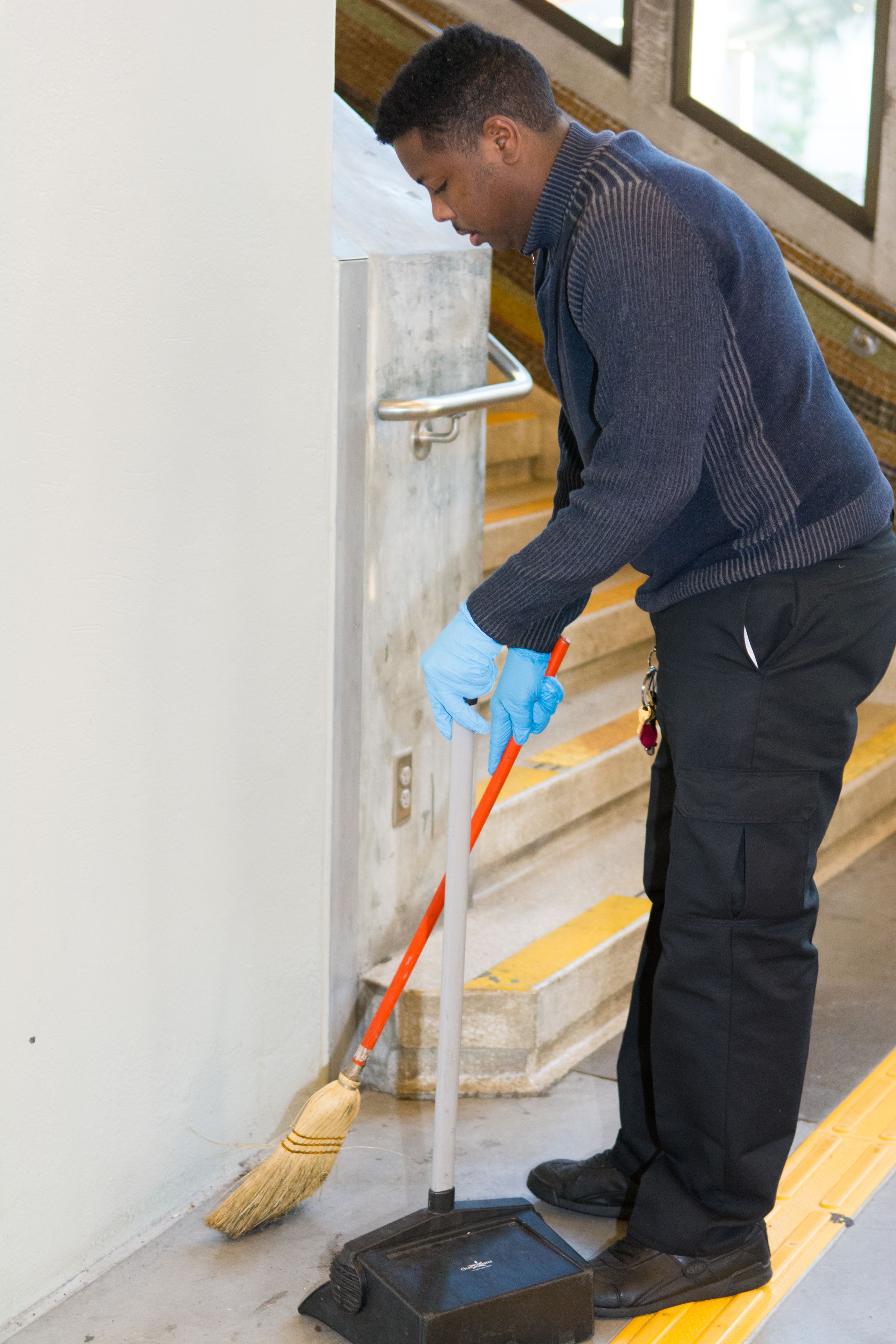
HOST: “What’s the most satisfying part of your job?”
BAKER: “For me it is the things that I just talked about in that we’ve seen a very depressing, sometimes difficult situation begin to turn around. That’s one part. The other part that’s satisfying to me is to see a group of workers that’s dedicated, comes to work every day, they take a lot of heat for what they do, and to see them rise above it. Many of them, as I mentioned earlier, go on to become BART train operators, elevator escalator mechanic attendants, and I’m really proud of the effort they have put in to get those jobs. They do that training while they’re at BART they go to sometimes outside institutions for schooling through BART and they still come to work and do a great job on their way to their next career move, which is great.”
HOST: “How about you Juan?”
MATTA: “I’m proud to help contribute to people getting to their jobs in a clean and safe manner. Every day to the Bay Area economy as a whole, I think transportation is a huge issue for the Bay Area. We all need to be able to get where we need to go and have a clean seat or a clean place to stand on a crowded train. Also, as Jeff was talking about, in our department in Rolling Stock and Shops we call it the Upgrade Program where car cleaners are recruited and apply for positions where they’re sent to local community colleges to get a mechanic certificate or an electronic technicians’ certificate. As they finish their studies they do into on-the-job training to be a vehicle mechanic or vehicle electronic technician, almost as an apprenticeship, and then move into those jobs. It’s a great entry-level career to get your foot in the door at BART. There are many people we have in our department who have been here for 10 or 20 years and are excellent at their job and love their job and thank god for them because we need them but many also do choose to pursue other opportunities and move up within BART.”
HOST: “Juan, given the resources that you have and the state of BART now and where you would like it to be down the road, what are your realistic expectations? In other words, what sort of a goal do you have for your team in terms of just how clean can BART cars be?”
MATTA: “We can always improve, we can always do better. With our resources that we have we look at hours and locations, where we can best position ourselves to intercept messes as they come through on the trains. We’re always looking at reallocating based on customer satisfaction surveys and what we’re hearing about where we’re needed the most throughout the system. But we’re definitely always looking to improve, and we can get cleaner for sure.”
HOST: “Jeffrey, same question for you. How about the stations?”
BAKER: “Continuous improvement is the goal and we look at the satisfaction surveys and now those surveys give us specific information about which platforms the customers feel need some attention. We know from earlier surveys it’s the high traffic areas that get the most notice because that’s normally where people are trafficking. They’re coming from the Ticket Vending Machine through the fare gates down the escalator or stairs or elevator down to the train platform. Those are getting more attention as some of the areas need a lot of scrubbing down. Our challenge is we have to do that when it’s not so busy because we don’t want to inconvenience customers by turning the escalators off, for example. With that kind of heavy cleaning we have to do off hours or very low patron hours so that work can get done because it’s very important that we pay attention to what our customers are noticing and react to it.”
HOST: “Any changes in the pipeline? It’s been a year of reform. A lot of different changes have been made in terms of how we structure our cleaning process, equipment for our teams, all that sort of thing. Anything else coming up?”
BAKER: “I think we’re going to continue to sharpen our skills in the training department. We have a couple months to go where everyone will get the baseline training and now we have a new hire training program, which is basically a two-week program that as we have new hires come into the department they’ll go through everything from soup to nuts to know how to professionally clean our stations. We’re also including the supervisory personnel in that training, so they get a taste of what they’ll need to be looking for as well as some other types of soft skill training for them. How they’ll deal with difficult situations, keeping our workers safe, making sure that our workers have the right amount of tools and supply to do the job.”
HOST: “Juan, how about for your team?”
MATTA: “It’s the same with us, tightening our standards. We have a process document, an official process document and it used to be just a list of tasks that would be performed on the trains and we recently took that and reworked and made it a step-by-step instruction manual with pictures and making everything very clear which products and equipment to use for every cleaning task that we do on board a train. That’s being used for new hires and we’ll have existing staff trained by the end of the quarter.”
HOST: “Jeffrey Baker BART’s Superintendent of System Service and Juan Matta BART’s Manager of Transit Vehicle Cleaning. Gentlemen, thank you both for joining us and talking about a subject that’s one of the top concerns for our riders. Thanks very much.”
MATTA AND BAKER: “Thank you, thank you.”
HOST: “And thank you for listening to ‘Hidden Tracks: Stories from BART.’ You can listen to our podcasts on SoundCloud, iTunes, Google Play, Stitcher, and of course at our website BART.gov/podcasts.”